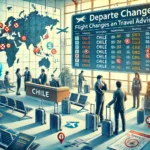“`html
Conor Murphy Highlights Digital Travel Permit Concerns for Travelers
Travelers across the globe are now facing a new set of challenges as digital travel permits become a staple of international journey planning. Politicians, such as Conor Murphy, have raised pressing concerns about how these changes may impact the travel experience, especially at a time when global mobility is paramount. In this article, we will delve into the implications of digital travel permits, the specific worries emphasized by Conor Murphy, and how travelers can prepare for these new requirements.
The Rise of Digital Travel Permits
As countries strive to safeguard public health while maintaining open borders, digital travel permits have emerged as a promising solution. These permits typically require travelers to provide information such as vaccination status, recent test results, and travel history before they are allowed entry.
The benefits of digital travel permits include:
- Streamlined processes: Digital systems promise faster processing times at international borders.
- Improved accuracy: Automated checks reduce human error, ensuring that only eligible people enter a country.
- Enhanced security: Digitization allows for more sophisticated threat detection and management.
Concerns Raised by Conor Murphy
Despite the advantages, Conor Murphy has highlighted several issues that must be addressed for these systems to work effectively and equitably.
Lack of Accessibility
Murphy underscores the potential discrimination against individuals who do not have easy access to digital technology. Many travelers, especially the elderly or those from less affluent backgrounds, may find it challenging to meet digital permit requirements.
Data Privacy Issues
With personal health information being a cornerstone of digital travel permits, there is a heightened risk of data breaches. Murphy warns of the imperative to safeguard personal data against unauthorized access and misuse.
Implementation Disparities
Murphy also notes potential differences in implementation between countries. Some nations might develop robust systems quickly, while others lag behind, causing inequitable travel conditions for international travelers. Such disparities could result in confusion and uneven travel experiences.
Understanding the Traveler’s Perspective
For the frequent traveler, these developments mean staying informed and prepared. Understanding your destination’s digital travel permit requirements is essential for a hassle-free journey. Here’s how travelers can prepare:
Stay Informed
- Regularly check official government websites for updates on entry requirements and digital permit specifications.
- Follow credible news sources for the latest changes in international travel protocols.
Ensure Access to Digital Tools
- If you lack the necessary technology, seek assistance from friends or services that provide tech support for travelers.
- Consider utilizing smartphone apps that facilitate the travel permit process, ensuring your capability to manage travel documentation digitally.
Understand Data Privacy Policies
- Review the privacy policies associated with digital travel permits to comprehend how your information is stored and used.
- Be proactive about security measures, such as using two-factor authentication, to protect your data.
Looking Toward the Future
The journey towards effective implementation of digital travel permits is fraught with challenges and opportunities. As Conor Murphy and others continue to advocate for fair and just travel practices, governments and organizations must work collaboratively to ensure that these digital solutions do not become barriers but, instead, gateways to safer and more efficient travel.
Digital travel permits are set to become a permanent feature of global movement. Their success will largely depend on the ability of authorities to address the issues raised by Murphy and other stakeholders. This collaborative effort will ensure these systems serve the dual purpose of protecting public health and supporting the freedom to travel—a balancing act that promises to define the future of global mobility.
For now, travelers must remain vigilant, informed, and adaptive. As this dynamic landscape evolves, staying up-to-date will be key to experiencing the joys of travel without the pitfalls of the digital age.
“`









